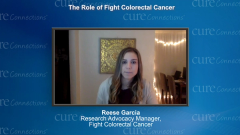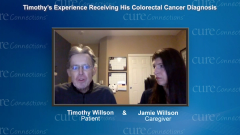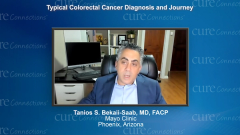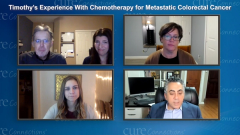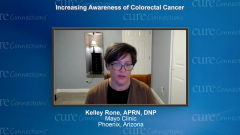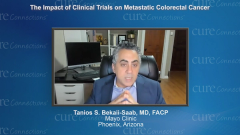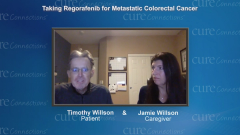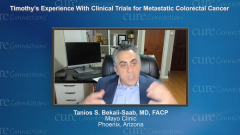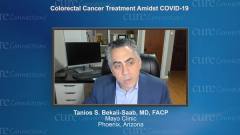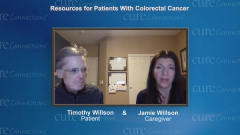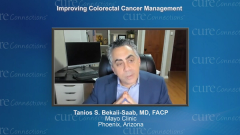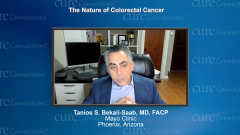
Improving Colorectal Cancer Management
Episodes in this series

Tanios S. Bekaii-Saab, MD, FACP: We are going to move to the last piece here: thinking about how we can do better overall. Tim and Jamie, overall, what do you think? I know you think that we do great, but think about the overall world of cancer we live in. What do you think oncologists and the oncology team can improve in terms of managing patients, in terms of education, and in terms of treatment care? There are also a lot of financial implications, and we have not touched upon those. There is a whole hour that we could spend talking about that effect. Then, of course, how do we make sure that we end up meeting your needs? Any high-level thoughts about this?
Timothy Willson: It is all those things you just touched on. You worry about it. You always hear the scary stories of people who have exhausted their life savings to live two months longer, so that is something definite that we decided. I could have kept working, but my goal was to retire at age 55, so I stayed true to that. Keeping Jamie’s job and the insurance takes a bit of the burden off me as far as getting to the right providers. I did not have to change. We have gone through three insurance companies, and we have been able to stay with the same providers. That has helped a lot for consistency and everything.
Jamie Willson: You bring up a great question overall. Yes, we feel fortunate to have fallen into your hands, Dr. Bekaii-Saab, and Kelley’s, and that is great care. Looking more holistically, that is an important question. As great a job as you guys do, sometimes the pieces are not all connected. You guys do a great job, but then I get a bill from an insurance company saying that they are not going to pay for something. Sometimes it feels like the left hand does not talk to the right hand, and I have to fight with an insurance company. I have to get the paperwork that they need because they do not understand that a medication is not indicated for this, but it is still used that way in the oncology world. All those little pieces, sometimes from a holistic perspective, are out there floating around. I do not know what the answer is, but it feels overwhelming to try to keep all the pieces together. I often think about even older patients who might not have the ability to pull all those pieces together. How do they manage with all this? We are fortunate that we are in the field we are and that we have the resources we have. Even with all that, it can be overwhelming to fight with an insurance company or to try to get documentation when you just did that last month. Those are the pieces that, as a society, we could do better at.
Tanios S. Bekaii-Saab, MD, FACP: Absolutely. Reese, what about financial resources or directing patients to financial resources and navigating that? In addition to having a diagnosis of cancer and having to fight through that, you now have to worry about the finances and financial support as well as fighting insurers and filing for bankruptcy for some patients. There are a lot more tragedies than the eye can see. What tools are you able to use to help with this, or what tools may be needed in your viewpoint—if they are not out there—to educate folks more?
Reese Garcia: Fight CRC [colorectal cancer] does not provide financial support directly, and we generally point to our partners at Triage Cancer who are in tune with the legal battles patients and their families may face as well as insurance issues and finances. We have an established relationship with them, and we will do webinars every year or so to update our community on the different things that they might need to know. I would say that, even though we do not provide the financial support or necessarily the legal advice directly, we work with others to do so. From an oncological and a medical perspective, staying abreast of what advocacy organizations do and what types of resources they offer is extremely important to be able to point patients to the resources that exist, because there is a lot out there. Sometimes, it is not necessarily projected as much as it could be, but there are resources out there that are available, and advocacy organizations know about them and are able to point patients and their loved ones to those resources.
Tanios S. Bekaii-Saab, MD, FACP: Kelley, you help oversee, manage and ensure that the patients are navigated safely through their journey, and it takes a big team. You have the pharmacist and the nurse working with you and others as well. If you have to give guidance or give advice to other health care providers, patients or caregivers about the model that—from your viewpoint—facilitates this level of care the most, what would you say to your peers?
Kelley Rone, APRN, DNP: You have to have a conversation with your patients regularly about what they need. A lot of times, patients do not want to bother us with stuff: “I am having this thing, but I did not want to tell you because I know you are busy.” We have to listen to what our patients are telling us, and we have to educate them about letting us know what they need. We at the Mayo Clinic are pretty fortunate in that we have a lot of resources that other facilities may not necessarily have. We have social workers who are fantastic, and we have pharmacists who are brilliant. If a family member, patient or colleague outside oncology recognizes something that is happening, all they have to do is let us know. We may not have the answer for it, but we may be able to do something to make things better.
Tanios S. Bekaii-Saab, MD, FACP: We are certainly blessed to have that level of support for our patients. There are a lot of folks who work in the background: the finance person, the nurse, the technician, the pharmacist, the nurse practitioner, the physicians, from the chemotherapy nurse to the nurse who is focused on education, the navigator. It is a big team. The complexities of the system around how we care for our patients is immense, and we certainly hope to continue improving things with the support of organizations and advocacy groups with Reese’s work. Of course, we do all this for our patients, for you, Tim, and certainly for their families, Jamie and their son.
With that, I am going to thank all of you for this wonderful exchange. It was very educational, and it is great to be able to have this discussion with all of you. Thank you.
Transcript Edited for Clarity

